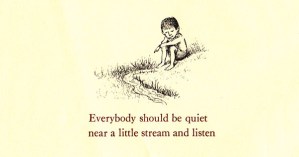On a regular October morning in 2011 I couldn’t access my email or Facebook. I didn’t think anything of it – I forget passwords all the time – and just tried again. Waiting for me upon entry were hundreds of messages and emails. Messages and emails with pictures of me in them.
Category: longform
Advice for the Accidental Community Manager
Advice for the Accidental Community Manager
Many online communities are accidental. It just happens.
10,000 Hours with Reid Hoffman: What I Learned
10,000 Hours with Reid Hoffman: What I Learned
Time to read: 50 minutes We touched down in Las Vegas only three hours before, but we were already back in the plane and flying home to San Jose on a brisk winter day in December, 2012. Not having to go through security at an airport saves a lot of time.
The New Yorker
Gary Snyder, the Zen poet, lives on a hundred backcountry acres in the foothills of the Sierra Nevada, meditates mornings, and thanks his food before he eats it, clapping his hands together and saying “Itadakimasu,” which is Japanese for “Thank you very much.
Full text: Invoking Hitler, Raghuram Rajan warns: A strong govt may not move in the right direction
Full text: Invoking Hitler, Raghuram Rajan warns: A strong govt may not move in the right direction
When Dr Raghuram Rajan, Governor, Reserve Bank of India, was invited to DD Kosambi Ideas Festival held on February 20, 2015 in Goa, who’d have thought that he would discard his RBI hat and put on his hat as “a professor in the field known as political economy “? And go on to give an extraordinary s
Is There Any Point to the 12 Times Table?—Wolfram Blog
My government (I’m in the UK) recently said that children here should learn up to their 12 times table by the age of 9. Now, I always believed that the reason why I learned my 12 times table was because of the money system that the UK used to have—12 pennies in a shilling. Since that madness ended with decimalization the year after I was born, by the late 1970s when I had to learn my 12 times table, it already seemed to be an anachronistic waste of time.To find it being given new emphasis nearly 40 years later struck me as so odd that I thought I should investigate it a little more mathematically. Here is what I concluded.
Source: Is There Any Point to the 12 Times Table?—Wolfram Blog
How to Live Without Irony – The New York Times
First, it signals a deep aversion to risk. As a function of fear and pre-emptive shame, ironic living bespeaks cultural numbness, resignation and defeat. If life has become merely a clutter of kitsch objects, an endless series of sarcastic jokes and pop references, a competition to see who can care the least (or, at minimum, a performance of such a competition), it seems we’ve made a collective misstep. Could this be the cause of our emptiness and existential malaise? Or a symptom?
9 Learnings from 9 Years of Brain Pickings – Brain Pickings
Allow yourself the uncomfortable luxury of changing your mind. Cultivate that capacity for “negative capability.” We live in a culture where one of the greatest social disgraces is not having an opinion, so we often form our “opinions” based on superficial impressions or the borrowed ideas of others, without investing the time and thought that cultivating true conviction necessitates. We then go around asserting these donned opinions and clinging to them as anchors to our own reality. It’s enormously disorienting to simply say, “I don’t know.” But it’s infinitely more rewarding to understand than to be right — even if that means changing your mind about a topic, an ideology, or, above all, yourself.
Source: 9 Learnings from 9 Years of Brain Pickings – Brain Pickings
Iran’s blogfather: Facebook, Instagram and Twitter are killing the web | Technology | The Guardian
The hyperlink was my currency six years ago. It represented the open, interconnected spirit of the world wide web – a vision that started with its inventor, Tim Berners-Lee. The hyperlink was a way to abandon centralisation – all the links, lines and hierarchies – and replace them with something more distributed, a system of nodes and networks. Since I got out of jail, though, I’ve realised how much the hyperlink has been devalued, almost made obsolete. Facebook Twitter Pinterest ‘The only way to stay outside this vast apparatus of surveillance might be to go into a cave and sleep’ … Derakhshan. Photograph: Arash Ashoorinia for the GuardianNearly every social network now treats a link as just the same as it treats any other object – the same as a photo, or a piece of text. You’re encouraged to post one single hyperlink and expose it to a quasi-democratic process of liking and plussing and hearting. But links are not objects, they are relations between objects. This objectivisation has stripped hyperlinks of their immense powers.
Source: Iran’s blogfather: Facebook, Instagram and Twitter are killing the web | Technology | The Guardian


